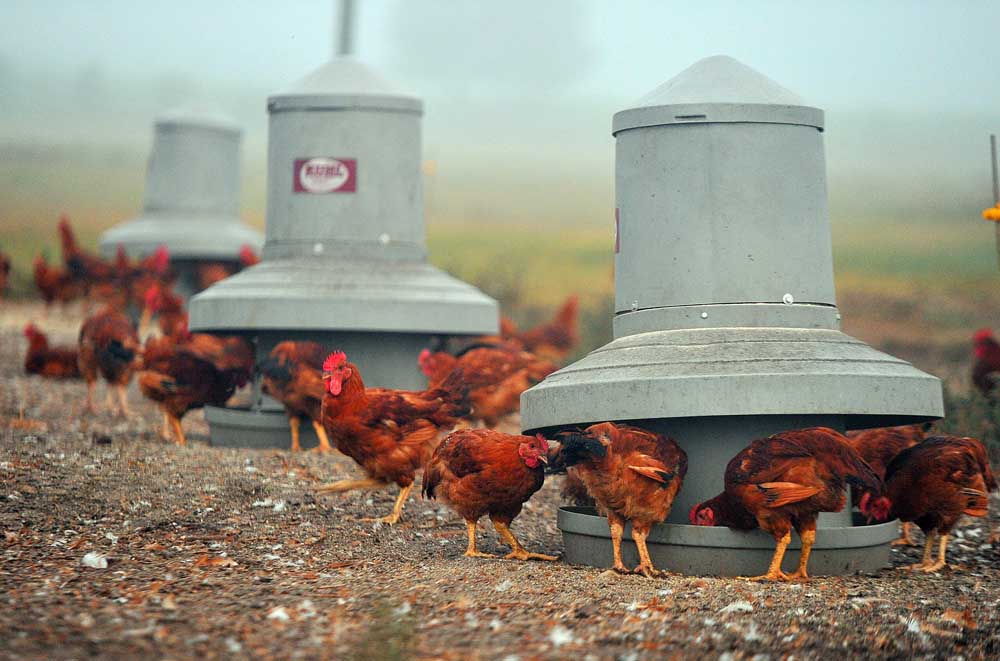Should ‘USDA Organic’ seal require better animal welfare?
Published 12:00 am Wednesday, January 24, 2018

- Free-range chickens eat at White Oak Pastures in Georgia. The chickens aren’t confined and are allowed to walk around as they please.(Brant Sanderlin/Atlanta Journal-Constitution/MCT)
A Trump administration decision aimed at scrapping higher animal welfare standards for organic poultry and meats has created a rift in the farm community.
At issue, the U.S. Department of Agriculture has withdrawn its support for a rule that would have, among other things, required more outdoor space for hens on organic egg farms.
The rule would have closed a loophole in the current regulations that allows large poultry farms to use screened-in porches as outdoor access. It also would have prohibited some practices such as “tail docking” where a cow’s tail is partially removed.
The rule was adopted two days before former President Barack Obama left office, in January 2017, but Trump’s Agriculture Department called for further review, saying the rule exceeded its statutory authority.
Last week, a public comment period ended with more than 47,000 comments received by the USDA, and all but a few favoring the changes that would require “USDA Certified Organic” meat and poultry producers to abide by stricter animal welfare standards.
Still, large farm groups said the proposed changes went too far in dictating how farmers must treat their livestock, and the Agriculture Department seemed to agree.
“With USDA’s wise decision to withdraw this rule, organic livestock and poultry producers can rest assured that they will not be forced out of business by another costly and burdensome regulation,” Senate Agriculture Chairman Pat Roberts, R-Kan., said in a statement.
“By withdrawing this rule, the Trump administration is again demonstrating its commitment to deregulate rural America,” Roberts said.
Yet some of the rule’s strongest supporters are in the $43 billion organic food industry, where Wisconsin is second only to California in production.
Consumers expect higher animal welfare standards from organic agriculture, said John Brunnquell, founder and president of Egg Innovations that has a farm in Cedar Grove, north of Port Washington, Wisconsin.
“This is about consumer confidence,” Brunnquell said, adding that most people who buy organic eggs believe the chickens have access to the outdoors, fresh air, sunshine and a natural diet of things like bugs and worms.
“The withdraw of this rule is one of the most foolish things the USDA could do. It’s the classic reason why consumers don’t trust big agriculture,” he said.
Egg Innovations, a network of 65 farms in five states, says its chickens get a minimum of 22 square feet per bird access to the outdoors, much higher than the current minimum USDA standard that allows for small screened-in porches.
“We have more than a million birds doing this,” Brunnquell said.
About half of the organic eggs produced in the United States are from chickens that get outdoors and can express their natural behaviors, such as scratching in the dirt for bugs and taking dust baths, according to Brunnquell.
“So we think it’s a fear-mongering statement that costs would explode, and that family farms would go out of business,” from a higher animal-welfare standard, he said.
Much of the debate has been centered on organic poultry and eggs.
“People buy organic because they think these birds are living a better life, and that they’re not in a cage, but some of these aviary systems are nothing more than glorified cages,” said Mark Kastel, director of The Cornucopia Institute, which closely follows the organic industry.
“The USDA has never enforced language in its rules that says all organic livestock must have access to the outdoors,” Kastel said.
The U.S. Poultry & Egg Association, based in Tucker, Georgia, did not return Milwaukee Journal Sentinel calls asking about its position on the organic rule.
Other farm groups, however, said they worried that it would set a precedent for the livestock industry, reversing years of USDA policymaking that mostly separated animal welfare from the definition of certified organic products.
“We work with a host of specialists, from animal scientists to nutritionists, to manage our farms in the best manner possible to ensure wholesome, healthy food. This rule, on the other hand, has been about pushing an agenda rather than advancing food safety or animal welfare,” American Farm Bureau President Zippy Duvall said in a statement.
Some of the rule’s provisions would conflict with environmental and food-safety regulations, said Karen Gefvert, director of government relations for the Wisconsin Farm Bureau Federation.
“And we don’t think that animal welfare standards should be tied to the organic label,” Gefvert said.
Years ago, according to the National Pork Producers Council, Congress laid the groundwork for organic livestock products by setting parameters around how animals could be fed and what types of medications would be used.
A handful of large farms control about half of the U.S. organic egg industry, according to those in the business, and the trend has been toward industry consolidation.






